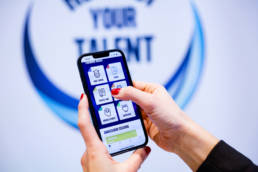A festival of dual career: Delegates from 17 different countries attended the STARTING 11 Conference on 12 May 2022 in the Amsterdam Olympic Stadium, co-hosted by the Amsterdam University of Applied Sciences & TWIN.
Policy-makers, programme coordinators, sport coaches, researchers, academics, teachers, psychologists, career counsellors, lifestyle advisors, player development managers, and of course athletes: The variety of dual career stakeholders gathering last week in Amsterdam is living proof for the steadily growing importance of the dual career topic in the European Union.
“I am following the project since the very beginning, and I was looking forward to this conference for a long time.”
Kristiana Kazandzhieva, Bulgaria
In his keynote, TWIN CEO & Founder Wolfgang Stockinger lid the EU dimension of dual careers, both from an athlete and an environmental perspective. He presented dual career development environments as “interactive patterns of beliefs, expectations, motives, disciplines, communication processes, services, ethical standards, traditions, and cultures”. Transforming a theoretical dual career concept into effective action is consequently a complex task, likewise on athlete, practitioner and programme level.
Launch of the European Dual Career Toolkit
More than a third of EU member states rate their status & development of dual career arrangements as negative (European Commission, 2017). When asked for the reasons, these are 3 main implementation barriers mentioned (STARTING 11, 2019):
- A lack of policy and formalised programmes,
- a lack of dual career awareness, understanding in combination with a limited stakeholder engagement,
- and a lack of counselling programmes in place.
This is exactly where the EU-funded project STARTING 11 comes into play. Its European Dual Career Toolkit assists institutions in sport, education and the labour market to implement effective dual career services for athletes. As a digital ecosystem of dual career practice, the toolkit is based on these aforementioned concrete barriers, roots in the practice of some of Europe’s leading institutions in dual career support, and is translatable into different dual career development environments. The toolkit is now freely accessible on starting11.eu.
A self-tailored day
The festival format of the conference gave the delegates the chance to “customize” their own conference. At the event, they could move freely between thematic areas based on which offers were most relevant to their dual career practice:
- 3 different Tool Workshops areas helped to get to know the European Dual Career Toolkit in detail. STARTING 11 experts explained how selected tools could be applied in the daily dual career work. International practitioners provided associated examples of dual career practice.
- The Athlete-Student Stories area saw the world-class athletes Larissa Klaassen (Paralympic Cycling), Cees Juffermans (Short Track) and Johan Kenkhuis (Swimming) share game-changing moments of their dual career.
- The Speed-Dating & Networking area served as an open space for attendees to meet and exchange. On top, Stadium Tours gave the chance to go explore one of the most iconic buildings in European sport.
In the closing Round Table discussion led by Cees Vervoorn, the panellists Florencia van Houdt (European Commission – DG for Education, Youth, Sport and Culture), Larissa Klaassen (Paralympic Cycling), David McDermott (Liverpool John Moores University), and Laurent Carnol (National Olympic Committee Luxembourg) reflected upon future steps the dual career topic was required to take in the EU. Increasing the sport coaches’ buy-in and active support for holistic athlete development was addressed by several panellists and members of the audience.
“I learned a lot and I really love that the toolkit that was presented today is very hands-on.”
Joost van Westing, The Netherlands




